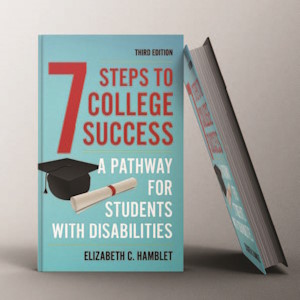The Student’s Responsibilities at College
Attention Magazine October 2023
Everyday Responsibilities
 Excerpted from the book Seven Steps to College Success: A Pathway for Students with Disabilities, 3rd Edition by Elizabeth C. Hamblet (2023). Used by permission of the publisher Rowman & Littlefield. All rights reserved.
Excerpted from the book Seven Steps to College Success: A Pathway for Students with Disabilities, 3rd Edition by Elizabeth C. Hamblet (2023). Used by permission of the publisher Rowman & Littlefield. All rights reserved.Follow the rules
Even if they are registered with their college’s disability services office (DS), students with disabilities are expected to meet the same responsibilities of every student at college. This treatment may be different from what students have experienced in high school. High schools have to follow special rules pertaining to discipline when it comes to students with disabilities and have to find appropriate placements for students who cannot learn in their neurotypical environments. Staffers might also have helped students with tasks beyond their academic work. Colleges aren’t subject to similar mandates.
Like their neurotypical peers, college students with disabilities are expected to adhere to their school’s honor, behavioral, and/or other kinds of codes. If they commit a violation, the college might consider whether their disability contributed to the violation, and it might seek feedback from DS as to whether students’ disability played a role in the violation, but it will likely handle these situations in the same way it would for students who don’t have a disability. In other words—having a disability is unlikely to automatically exempt them from any consequences (or mean they’ll experience different consequences) if they break school rules.
Complete the tasks of a college student
Students (regardless of whether they have a disability or not) are expected to complete the tasks associated with their education, such as completing enrollment forms, registering for courses, meeting with their advisor, etc., and to do so in the established timeline. Neither academic advisors nor DS offices are required to help students with these processes, though—if students ask—they might assist them initially to demonstrate how they work so that students can complete them independently next time.
Students are also typically expected to attend class (though some professors might not have a requirement for this). Those who suffer brief, intensive episodes related to their disability (e.g., students with mental health or physical/medical disabilities) may be allowed some flexibility in class attendance, but there will be a limit to how many classes they can miss.
Maintain a certain GPA
 At many colleges, students must keep a certain minimum GPA in order to stay enrolled. Schools do not have to hold students with a disability to a lower standard for this, and they don’t have to keep adding accommodations until students can meet that requirement. Just like their neurotypical peers, if students with disabilities don’t have the minimum GPA after their first term, they may be placed on probation (meaning the college is giving them one more term to get their GPA up) and required to do certain things in the next term, such as meet weekly with their advisor, attend tutoring sessions, etc. If their GPA isn’t high enough after the next term, they might be dismissed from the college. Again, having a disability doesn’t mean that students will be treated differently than their neurotypical peers.
At many colleges, students must keep a certain minimum GPA in order to stay enrolled. Schools do not have to hold students with a disability to a lower standard for this, and they don’t have to keep adding accommodations until students can meet that requirement. Just like their neurotypical peers, if students with disabilities don’t have the minimum GPA after their first term, they may be placed on probation (meaning the college is giving them one more term to get their GPA up) and required to do certain things in the next term, such as meet weekly with their advisor, attend tutoring sessions, etc. If their GPA isn’t high enough after the next term, they might be dismissed from the college. Again, having a disability doesn’t mean that students will be treated differently than their neurotypical peers.
Meet deadlines
College life is full of deadlines—for registering for classes, housing, etc. Students who have disabilities are expected to complete the same tasks as their neurotypical peers within the same time frame. While extended time for an in-class exam is a common accommodation, colleges don’t typically extend it to processes such as filing a form for graduation—it is generally applied to academic tasks only. (Of course, colleges can choose to show leniency for any student; they just don’t have to do so because that student has a disability.)
Specialized Responsibilities for Students with Disabilities
Register with DS if they want accommodations
Colleges are not required to locate students who have a disability and offer them services. Students must find and complete the school’s process to register for and request accommodations (if they wish to utilize them—if they don’t, they have no such obligation).
 Even if students choose to disclose their disability when they apply to college (this is not required), they still have to complete the DS registration process if they want to use accommodations. An anecdote in one study shows why students need to be told this directly. A college freshman who applied for accommodations after he was placed on academic probation said that because he mentioned his disability in his application for admission, he “thought that would be it” (Lightner et al, p. 152); no one ever told him that he had to formally register. It is crucial that adult members of the team explicitly tell students that they must register with DS in order to receive accommodations.
Even if students choose to disclose their disability when they apply to college (this is not required), they still have to complete the DS registration process if they want to use accommodations. An anecdote in one study shows why students need to be told this directly. A college freshman who applied for accommodations after he was placed on academic probation said that because he mentioned his disability in his application for admission, he “thought that would be it” (Lightner et al, p. 152); no one ever told him that he had to formally register. It is crucial that adult members of the team explicitly tell students that they must register with DS in order to receive accommodations.
Readers should be aware that the decision to apply for accommodations and services belongs to students. Colleges can’t force them self-identify; they just aren’t obligated to provide accommodations to students who don’t register with DS.
In one study, students who eventually registered for accommodations after one or two terms (and who had lower GPAs and had earned fewer credits than those who registered upon starting at college) said they didn’t do so earlier because they thought the process would be time-consuming (Lightner et al, 2012). But at most schools, it isn’t.
Typically, students have to:
- complete a registration form that asks for basic information such as their school address, email address, etc. It may also ask what disability they have, what accommodations they want, and which accommodations they have received in the past; many colleges use an online form for this.
- submit that form to DS along with a copy of their disability documentation.
- attend what’s commonly called an intake meeting with a member of DS staff. This meeting may run anywhere from thirty minutes to an hour.
It’s a simple process (much more so than the process for applying for financial aid, for example).
Typically, if students don’t complete any part of the process (e.g., they turn in their documentation but not their form or they turn in all of the paperwork but never come for a meeting), they are not considered registered, and DS will not review their requests. DS offices aren’t required to follow up with students who don’t complete their registration process, though some may do so voluntarily (but not necessarily more than once). It’s students’ responsibility to initiate and make sure they complete their DS registration.
Although colleges are not required to identify students with disabilities and suggest that they register with DS, they may inform incoming freshmen and transfer students about the existence of accommodations and how students can access them. Colleges may do this by putting information about DS in student handbooks, sending information describing services with students’ acceptance letters, posting disability-related information on their websites, and holding information sessions during new student orientation or setting up a table at a student services fair. It remains students’ responsibility, however, to contact the DS office to begin the process of applying for services if they want accommodations.
Because a DS review of students’ documentation and arrangement for accommodations can take some time, it is important for students and their families to know that students may be able start the process as soon as they have been admitted to and enrolled at a college. They may not have to wait until they arrive on campus for orientation or the first week of classes. And those who do register before classes start may find that their process is completed more quickly than it would have been if they had waited, because DS offices tend to be flooded with registrations in the first weeks of any term.
Notify professors about accommodations
Many of the DS directors interviewed for this book said their office uses an online system for managing accommodations (a popular one is called Accessible Information Management, or AIM). Once accommodations are approved, DS will prompt students to log in. From there, students may be asked to indicate:
- which professors they want notified of their accommodations.
- which accommodations they want each professor to know about. (It is their decision whether to share everything with everyone, or be selective about what they share.)
 At some colleges, the student will then be in charge of sending the electronic notification to professors; at others, this information may go to a queue, and the director or other staff member may send the notifications out in batches.
At some colleges, the student will then be in charge of sending the electronic notification to professors; at others, this information may go to a queue, and the director or other staff member may send the notifications out in batches.
Some schools use a system where they generate a letter instead, which lists all of the accommodations for which students have been approved. Students may be responsible for emailing these to professors, or for printing them and delivering them to professionals by hand. They may even be required to have professors sign the letters, and students may then have to deliver the signed copies back to DS to confirm that professors have seen them. (This is for students’ own protection—in case professors later say they weren’t aware they were approved for accommodations.)
Complete processes related to their accommodations and do so in a timely way
Students who need accommodations for exams may have to submit a form to DS ahead of the test date (e.g., two weeks in advance). This is so that DS can go through all the steps involved in arranging their accommodations in time for the exam, such as finding a room for the testing, hiring a proctor, and getting the exam from the professor in time to have it delivered to the testing site. If a student doesn’t submit the form by the DS deadline, they may not receive their accommodations for that particular exam. (This applies only to any exam for which a form was submitted late; if they do it before the deadline next time, they’ll receive their accommodations.)
At some colleges, DS may be not even be involved in exam accommodation arrangements, leaving it up to students and professors to work out details such as exam location and timing. If this is their college’s procedure, students can usually request some assistance from DS, especially in their first semester, but DS will not generally take over the process for students. It is considered reasonable for college students to have a hand in arranging their own accommodations.
As already noted, college offices and departments can choose to make exceptions for students with disabilities who fail to meet deadlines for college processes, but they don’t have to. And sometimes a missed deadline creates a situation that they can’t fix.
For instance, when it comes to deadlines such as those for requesting housing accommodations or requesting to use a space in the university testing center, colleges may choose to consider requests from students who don’t meet the deadline. But they are not required to remove another student who did meet the deadline from the dorm room or testing space in order to accommodate a student who didn’t.
When it comes to submitting forms for upcoming exams, even DS offices who want to be flexible still may not be able to coordinate accommodations in time if students miss the deadline. Many won’t be able to do this on short notice. If they are already providing accommodations for several students in a large class taught by the same professor, such as Introduction to Humanities, they may be able to include students who have missed the deadline.

 Elizabeth C. Hamblet has worked as a learning disabilities specialist in college disability services offices for two decades. In addition to working at a university, she is a nationally requested speaker on preparing students with disabilities for successful college transition. Hamblet is the author of Seven Steps to College Success: A Pathway for Students with Disabilities (Rowman & Littlefield, 2023) and a concise guide on this subject, and her work has appeared in numerous journals and online platforms.
Elizabeth C. Hamblet has worked as a learning disabilities specialist in college disability services offices for two decades. In addition to working at a university, she is a nationally requested speaker on preparing students with disabilities for successful college transition. Hamblet is the author of Seven Steps to College Success: A Pathway for Students with Disabilities (Rowman & Littlefield, 2023) and a concise guide on this subject, and her work has appeared in numerous journals and online platforms.
REFERENCES
Lightner, Kirsten L., Deborah Kipps-Vaughan, Timothy Schulte, and Ashton E. Trice. “Reasons University Students with a Learning Disability Wait to Seek Disability Services.” Journal of Postsecondary Education and Disability 25, No. 2 (2012).


